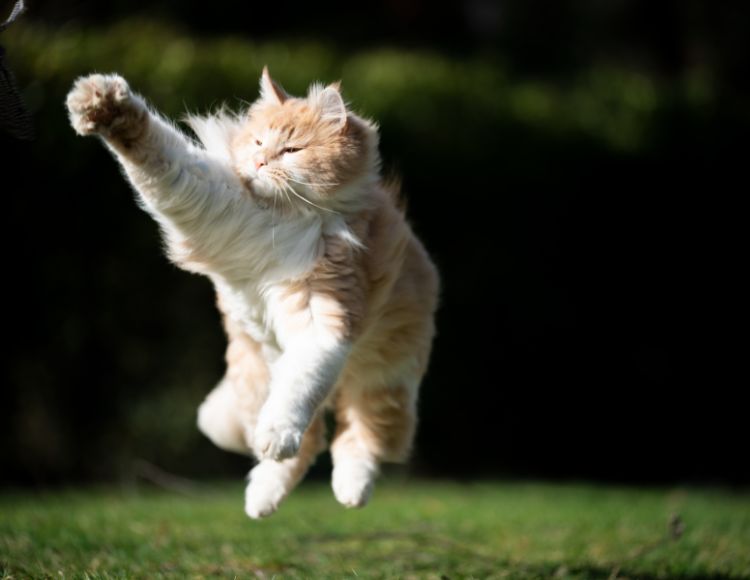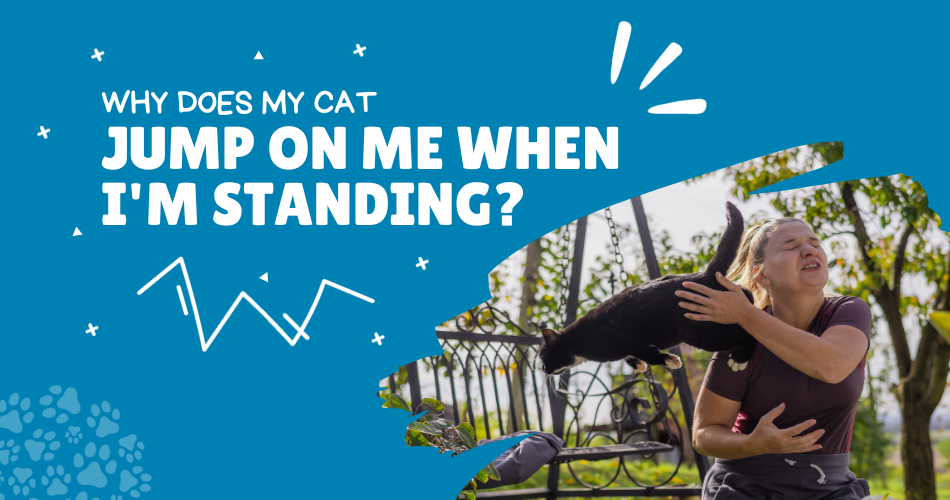As a cat owner, you must have witnessed numerous strange behaviors from your cats. Sometimes, these behaviors can be cute and endearing, and sometimes, these behaviors can be unwanted, frustrating, or confusing.
One common question among cat owners is, “Why Does My Cat Jump On Me When I’m Standing?” It is a common behavioral issue for cats to jump on their owner.
Cats usually jump on their owner when they want attention, want to play more, or due to excitement or anxiety.
In this article, we will discuss why your cat jumps on you when you’re standing and the techniques to stop this behavior.
So, let’s dive into the details.
7 Reasons Why Does Your Cat Jump On You When You are Standing
The exact reason your cat jumps on you when you’re standing may vary depending on the situation and surroundings. Let’s explore some of the top reasons for this unwanted cat behavior.
1. Your Cat Wants To Play With You
Cats are naturally playful creatures. They always look for the opportunity to engage in fun games and activities. When your cat jumps on you while standing, it could be a sign that they want to play.

When your cat sees you standing, it may think of you as a moving object. It may trigger your cat’s playful instincts. At that moment, your cat wants to play with you. So, when they jump on you, they invite you to join in their playful activities.
Suppose you are at home and doing something while standing. Your cat will jump on you to indicate they want to play with you.
2. Your Cat Wants More Playtime
Most of the cats possess high energy, and they prefer more playtime. These cats have to burn a lot of energy. If their play sessions are short, they might jump on you to request more quality playtime.
As you are the cat owner, your cat spends most of their time with you. They see you as their favorite playmate and are eager to share interactive playtime with you. To request you for more playtime, they might jump on you.
Suppose you took your cat outside to play. After playing for a certain period, you are preparing to return home. If the playtime is insufficient for your cat, it will jump on you to convey that it wants more playtime.
3. When They Think You are Avoiding Them
Cats can understand human behavior very well. They will try to reclaim your attention if they sense you intentionally avoid them. They might jump on you until you are attentive to them.
If you are busy with work and looking at your computer or phone screen, your cat might think you are avoiding them. So, they will jump on you so that you don’t avoid them, and they can be a part of your world.
Even when you are sleeping, your cat may think you are avoiding them. So, you may experience at times that your cat jumps on you when you’re sleeping.
4. Attention-Seeking Behavior
Attention-seeking is a normal behavior of pets. Cats are masters of seeking attention. Although cats are independent pets, they crave attention from their human companions.
Cats always want attention from their owner. They can generally meow or paw at you, jump up on you, bite the nib of your pen, walk around and between your legs, or steal objects when you are busy with something.
Suppose you are standing and doing something important. When your cat feels a lack of attention, the cat will jump on you to keep your focus on itself. It jumps on you to be noticed and be near you.
5. Some Cats May Jump On You Due To Anxiety

Some cats may experience fear or anxiety, leading to unexpected behaviors like jumping on you.
When your cat is afraid of something or anxious, it might do unusual things like jump on you, cry like a baby, or meow loudly. They will try to seek help from you, and for that, they may jump on you while you’re standing.
This behavior provides them with a sense of security and comfort. They know you will protect them. Jumping on you might help reduce their anxiety.
6. Signs of a Behavioral Problem in Cats
Cat jumping is usually harmless and adorable. However, this behavior can be aggressive and excessively clingy as well.
If your cat jumps on you persistently while standing, it could be a sign of your cat’s behavior problem. The reason for this behavior can be separation anxiety or territorial aggression.
Monitor your cat’s behavior to identify any signs of concern. Consult a veterinarian or animal professional if your cat jumps excessively and aggressively.
7. Communication and Bonding
Cats try to communicate and strengthen their bond with their owners uniquely. Jumping on them when they’re standing can be one of them.
If your cat jumps on you, it could be your cat’s way of showing affection. You need to understand your cat’s body language and vocal cues to understand its intentions better. They do it to improve the emotional connection and deepen your relationship with your cat.
What Are Some Techniques For Managing Cats Jumping Behavior & How To Stop It?
Every cat likes to climb and jump. Cats jump large distances and climb trees to explore their territory, stay safe, and get food.
But if your cat has developed the habit of jumping on you, you need to know how to stop your cat from doing so. Here are some techniques that can help to stop this behavior:
Provide Alternative Surfaces
Cats love to climb and explore high places. That’s why your cat wants to climb up on you when it sees you standing.
If you can provide them with alternative surfaces like cat trees or shelves, you can divert their attention away from keep jumping on you. It will redirect their jumping behavior toward those surfaces. Alternative high surfaces will help your cat fulfill its natural instinct and serve as a resting spot.
Apply Positive Reinforcement
Positive reinforcement is an effective technique for improving your cat’s behavior. When your cat avoids jumping on you while standing, reward it with treats, praise, or petting.
It will help them to understand which behavior you are appreciating. Ensure to reward them immediately after their action for positive outcomes.
Play and Exercise
Most cats possess high energy. So, they need to burn their energy by playing and exercising. Lack of exercise and playtime can lead to unwanted behaviors like jumping on you.
Engage your cat in interactive play sessions and regular movements. It will lessen the possibility of your cat jumping on you by redirecting their energy towards games and exercise. Regular playtime and exercise will burn their energy, entertain your cat, and provide mental stimulation.
Stay Consistent
Set clear boundaries for your cat’s behavior and maintain them constantly to manage its behavior. For example, if you don’t want your cat to jump on you while standing, gently remove them from you every time they attempt to jump.
Consistently follow these boundaries and ensure everyone in your household follows them. It will help to prevent your cat from jumping on you.
Create Safe Zones
Your cat’s jumping behavior might arise when they feel alone or anxious. Creating safe areas in your home will help your cat to feel secure while being in those areas. It can help to stop their unexpected jumping behavior.
Can I Train My Cat Not To Jump On Me When I’m Standing?
Cats are highly adaptable and can learn very quickly. You can train your cat not to jump on you with suitable approaches. Train them with patience and maintain a positive approach to teach them proper behaviors.
Start with basic cat commands like “down” or “off.” When they try to jump on you while you’re standing, gently but firmly say the command. Whenever they follow your command, give them treats or praise them.
Observe properly what triggers your cat’s jumping behavior. Particular objects, sounds, movements, or situations could make them jump on you. They might be scared or anxious because of those triggering objects. Remove or fix those to help your cat relax and stop jumping on you occasionally.
Training a cat for suitable behaviors takes time and patience. Provide them with cat trees or high surfaces, feed them generously, or engage in intense play to stop their unwanted jumping-on-you behavior.
If your cat’s jumping behavior remains despite your efforts and training, seek professional help. Don’t hesitate to consult with a professional animal behaviorist, a veterinarian, or a cat trainer. They can provide personalized guidance and strategies to address the specific issues your cat is facing and help you stop this cat’s behavior.
How Long Does It Take To Train A Cat Not To Jump On Me?
Training your cat not to jump on you when standing requires time. The time of training a cat varies based on several factors. It can vary for their breed type, age, temperament, or previous experience.
Each cat breed has a unique personality. Some cats are eager to please, and some are stubborn. It takes time to train a stubborn cat compared to the cats that want to please their owners.
Younger cats tend to learn new behaviors more quickly than older cats. Older cats must be trained with patience. Training will take longer if your cat has developed and learned the jumping habit.
After starting the training, you may see improvements within a few weeks to a few months of consistent training. Some cats may respond quickly to training, while others may take longer. It’s essential to be patient throughout the training process.
Conclusion
Almost every cat might jump on you. It is normal behavior for cats. A desire for attention or affection often drives your cat’s tendency to jump on you when you’re standing.
Understanding why your cat jumps on you when standing is the first step in managing this behavior. Providing appropriate play and attention outlets and creating a safe environment can help redirect your cat’s behavior and improve your bond.
If your cat’s jumping is becoming a concern, you can stop it with positive training sessions, playtime, exercise, affection, or professional guidance.

